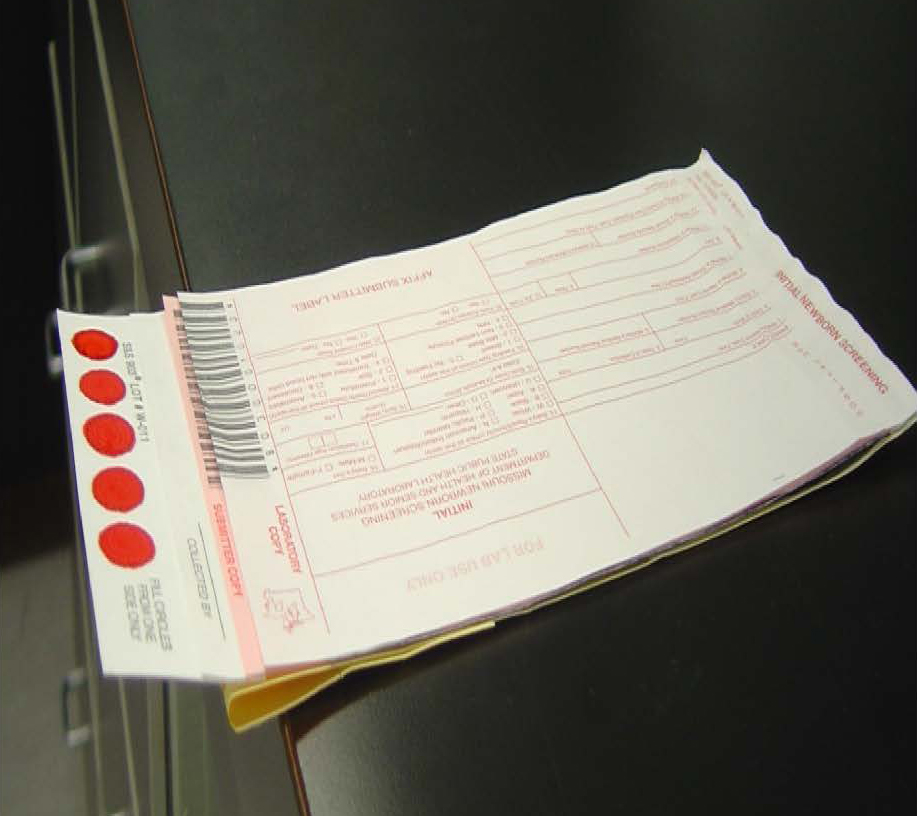Galactosemia
Brief Description
An inherited autosomal recessive disorder of galactose metabolism caused by the lack of a liver enzyme required to breakdown galactose to glucose. Galactose is a breakdown product of lactose, which is most commonly found in milk products. When galactose cannot be broken down, it builds up in the cells and becomes toxic.
Laboratory Unit
Methodology
Quantitative enzymatic assay
Analyte measured: Galactose-1-Phosphate Uridyl Transferase
Specimen Collection
Missouri newborn screening samples must only be collected on the Food and Drug Administration (FDA) approved blood collection forms that must be pre-purchased from the MSPHL. The optimum collection time is between 24 and 48 hours-of-age. The instructions for collecting the samples are listed on the back of the collection form. All 5 circles on the filter paper need to be filled with blood from one side and then air dried for at least 3 hours in a horizontal position without allowing the blood to touch any surface during drying, including other parts of the card. (Example on the right)

Storage/Transport
Store the dried blood samples at room temperature in the envelopes provided by the MSPHL and transport within 24 hours of collection.
Acceptable Specimen Type(s)
Initial Screen (the red form) or Repeat Screen (the green form)
Test Request Form(s)
Included in kit.
Possible Results
Normal - The final newborn screening reports are mailed to the submitter and physician of record.
Borderline Risk - Repeat the newborn screen or contact a Newborn Screening follow up center. The final newborn screening reports are mailed to the submitter and physician of record.
High Risk - Contact a Newborn Screening follow up center immediately for appropriate follow up testing, consultation, diagnosis, and treatment. Final results are phoned and faxed to physician/health care provider and appropriate follow up center. Follow up centers are contracted by the Department of Health and Senior Services (DHSS) for follow up tracking, testing, diagnosis, and counseling.
Interpretation of Newborn Screening Results for Galactosemia
Interfering Substances
Infants who need a Red Blood Cell (RBC) transfusion or antibiotics should be screened prior to instituting these therapies.
NICU (Neonatal Intensive Care Unit) Guidelines and Key for NBS (Newborn Screening)
Pre-transfusion: at any hour of age results are valid
- Post-transfusion: Greater than or equal to 30 days post transfusion results are valid
False negative galactosemia results may occur in infants if they:
- are being treated with antibiotics
- recently received blood transfusion
False positive results may be caused by:
- improper collection technique or improper handling of sample
- improper drying
- samples placed in plastic prior to drying
- delayed transit or exposure of specimen to heat or humidity
Proper collection, drying techniques and reducing transit delays can help to reduce false positive results.
Result Reported
1 to 3 working days after receipt of specimen
Fees
$130 charge - for full panel of screening disorders.
CPT Codes
82776
LOINC/SNOMED Codes
N/A
Additional Information
Prevalence of Disorder: 1:40,000 in Missouri
Follow Up Testing and Treatment: Follow up testing usually includes a quantitative Galactose-1-Phosphate Uridyl Transferase (also known as GPUT or GALT) assay and mutation testing that determines the genotype of the baby. Additional testing may be ordered by the physician.
Decreased transferase levels require prompt diagnostic testing to determine if the baby has classical galactosemia or is a carrier for the disease. It is highly recommended that the baby’s physician/health care provider contact one of the Newborn Screening Follow Up Centers for consultation, diagnosis, and treatment.
Treatment consists of withdrawal of all foods containing lactose and galactose from the diet and should be done in consultation with a pediatric metabolic specialist. Soy formula is used. Parents require education in assessing food labels and in food preparation.
Variant Forms of Galactosemia: There are several genetic variants characterized by less severe reduction in the enzyme activity (e.g. Duarte variant). Although most of these individuals are asymptomatic, all should be evaluated, as some will require management and monitoring.
Galactokinase Deficiency is a rare enzymatic defect that is also recessively inherited. It results in cataracts in infancy and possibly mild mental retardation. The life-threatening symptoms of severe galactosemia do not occur.
Galactose Epimerase Deficiency is caused by defective UDP glucose 4-epimerase, and results in accumulation of galactose-1-phosphate in the red blood cells and is usually benign.
For more information on this Disorder, visit the DHSS Newborn Screening website.
